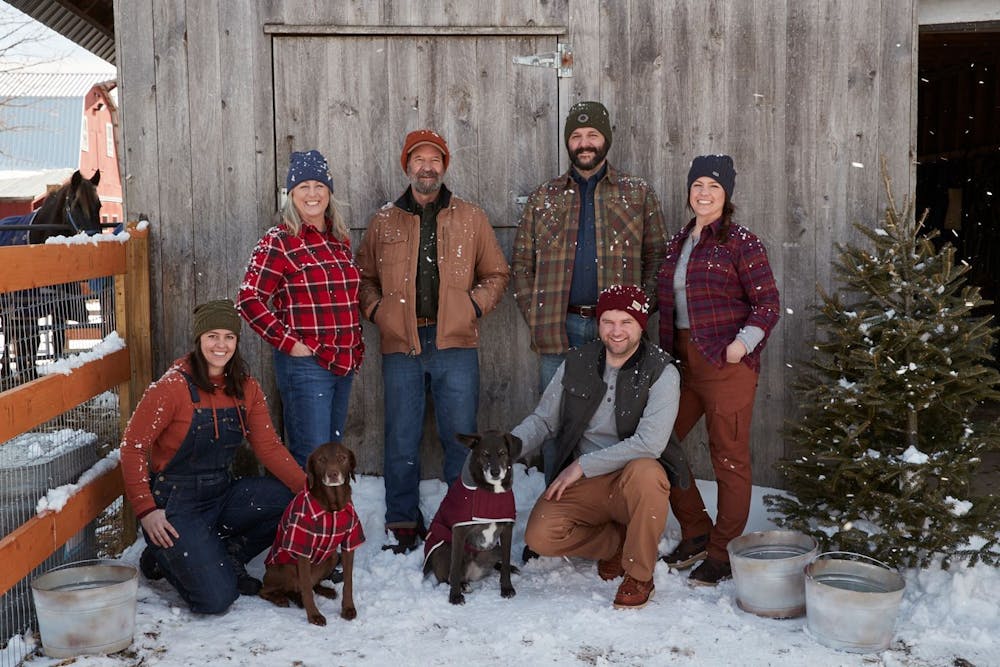Werner Tree Farm, a family-operated Christmas tree farm in Middlebury, has been selling cut-your-own trees and spreading holiday cheer since 1986. Over the past few years, the Werner family has worked to improve their sustainability practices and diversify the farm’s offerings.
Founders David and Cheryl Werner continue to take an active role in the operations of the farm, while their children have also stepped in to take on other responsibilities, with Amanda serving as marketing manager and William tackling a customer-facing role during the busy season helping customers choose, net and take their trees home.
For their peak season in December, the Werners hire about ten seasonal employees to help customers with tree selection. Staff includes local high schoolers and Middlebury College students, including Kristyn Carroll ’26. The Werners have previously provided holiday trees to the college and milled lumber for the 2011 Solar Decathlon house.
Caroll said she appreciates the Werners’ willingness to teach her the necessary skills for baling and transporting trees and welcoming her as a part of the team.
“It has really opened my eyes to the hard work that goes into maintaining a Christmas tree farm,” Carroll wrote in an email to The Campus. “I have learned so much about the processes involved that I had never considered in the past.”
Caroll also described the perspective she has gained from working on a farm devoted to sustainability and a deeper connection with nature, as well as having a chance to connect with a different part of the Middlebury community.
The seasonal nature of a holiday business makes December an intense month for the Werners, but the planting and tree care process turns the tree farm into a year-round endeavor. The late winter following the holiday season and the spring mark planting season for young trees, which take about a decade to grow into mature Christmas trees. Summertime calls for trimming each individual tree and managing agriculture and sheep. The Shropshire sheep on the farm are used for grass management because they graze without causing damage to the trees.
“Each year each tree gets trimmed by hand with a thin kind of machete-like knife that's called a shearing knife,” Amanda Werner said.
The farm has somewhere between 15 and 20,000 trees, and it takes about five minutes to trim each tree. “That's a considerable amount of time,” she added.
In addition to Christmas trees, Werner Tree Farm creates holiday wreaths. Their non-Christmas products include honey, which they have been producing since 2008, as well as horse hay, maple syrup, yarn and lamb meat.
In 2019, the Werners introduced Shropshire sheep to the farm as they work to implement sustainable agriculture practices.
“They're notoriously picky eaters, which is fantastic for us because they don't want to eat the trees, other kinds of sheep and Christmas trees and they'll probably nibble on the trees and probably not the branches you want them to,” Amanda Werner said. Shropshire sheep are commonly used in Europe for grass management at tree plantations and apple orchards, she added. Keeping the sheep is labor intensive due to their rotational grazing practice, which requires moving their pasture every two to three days.
“But they've been doing a good job. They keep the grass down. They haven't eaten trees yet. So we're pretty excited about them,” Amanda Werner said. Diversifying the farm’s product mix is an added bonus, she explained – grazing the sheep has reduced the need for mowing, reducing the use of machinery on the farm.
In addition to sheep, the Werners have implemented several other sustainability initiatives. Four years ago, they added solar panels to the roofs of the buildings, so the farm is now fully solar-powered. The family also uses tree waste products to make compost and perform carbon cycling.
“The trees that don't get bought, the lower branches that got cut off, all of that gets composted and then we put that back on the trees,” said Werner. The ultimate goal of implementing sheep is to eliminate the use of synthetic fertilizer on the farm.
Just as this past summer’s heavy flooding in Middlebury affected the crop of apple orchards and other farms in town, the heavy rain impacted many trees. The farm received 44 inches of rain this summer, almost triple usual levels.
“We lost probably around 50% of the trees on the farm this year. A lot of those were the younger trees,” Amanda Werner explained. Given that it takes about 10 years to grow a Christmas tree, future planting will be an important part of the farm’s recovery strategy.
By planting as many trees as possible and implementing sustainable soil management practices to increase survival rates, the Werners hope to bounce back.
As a family, the Werners have also shared in unique achievements, having previously sent special-order trees to the Supreme Court, the Metropolitan Museum of Art in New York City, and even as far as Bermuda, in addition to providing trees to three Vermont governors.
After nearly 40 years in business, seeing repeat customers is also a highlight for the family. “We have people who came when they were kids with their parents, and because the farm has been going for so long now, they come back with their kids,” Amanda Werner said.
Some customers have been coming to the farm since its first year, when the Werners sold 13 trees. The farm has since grown dramatically to an annual volume of 1200-1500 trees.
“There are some customers who are just so nice. They will come in and it'll be such a pleasant interaction,” she said. “Just knowing that you've created a good experience for somebody and that they appreciate what you do, and that you've added something to their Christmas season.”
Carroll shared a similar sentiment about her work on the farm. “It makes me smile thinking that the work I put in will make many families' days when they are getting ready for Christmas,” she wrote. “Now that I know how much work goes into Christmas trees, I have come to appreciate my family’s tree so much more.”
Amanda Werner stated her appreciation for the supportive nature of the Christmas tree industry in Vermont. “We can contact each other during the season, and it's generally a very friendly bunch,” she said.
Whether it’s asking for extra supplies of wreath rings or other items, or referring customers looking for out-of-stock items, the collaborative nature of the industry creates a community.
“I mean, it's Christmas tree farms. How cutthroat could people get?” she joked.

Olivia Mueller '24 (she/her) is a News Editor.
Previously an Arts and Culture editor, Olivia is an International Politics and Economics major with a Spanish minor. Outside of the Campus, she is a spin instructor for YouPower, an avid runner and hiker, and a member of the Middlebury Mischords a cappella group.




